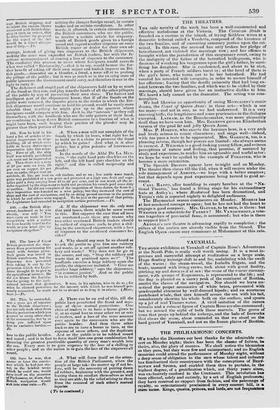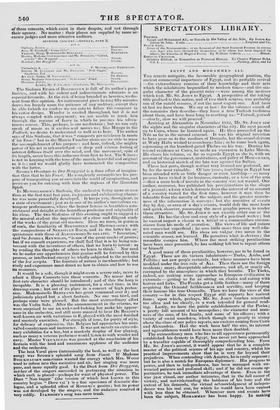THE PHILHARMONIC CONCERTS.
WE tender the Directors our best thanks for the admirable con- cert on Monday night; theirs has been the shame of failure, be theirs, also, the glory of success. We shall notice the blemishes as they pass, but they were few and unimportant; and no English musician could attend the performance of Monday night, without a deep sense of obligation to the men whose talent and industry has familiarized their countrymen with the conceptions of BEET- HOVEN and SPORR, and enabled there thus to partake, in the highest degree, of a gratification which, not thirty years since, was exclusively confined to the Continent. This revolution has been effected, solely and entirely, by a set of English professors; they have received no support from fashion, and the patronage of royalty, so ostentatiously proclaimed in every coneert bill, is a mare name. Kings, queens, princes, and lords, are not frequenters .of these concerts, which exist in their despite, and not through their agency. No matter : their places are supplied by more ac- -curate judges and more attentive auditors.
SEVENTH CONCERT—MONDAY, JUNE 2.
ACT I. .Sinfonia. Eroiea Berrnoven. Aris, M. Ivanhoff," Come Belo" PACINI.
Fantasia. Help. Wohonoiselle Brasil/aro Itsam•su.
Moto, Madame STOCKHAUSEN and Mr. NOMA Ps," Calmat, o hella" Per Hry9Eit 4P011R. Oserture, Der Berodst
ACT IL
,Sinfouia in A F. MEsnat,solor Ilawrnomor. Owl to M. DIA SHOFF aud Mr. Pun.t.tvs, " fuggir," Tra Rossist. Air t:ai ie. Violin, M. VIEUXTEMPS DR DERIOT, SCCII:1, MO1131111. STOCK HAVSKN. " Si 10 sento," Faust SPOHR. Chenille, Piddle BEETHOVEN. Leader, Mr. F. Cum in -Conductor. Mr. Moscii F. Lys.
The Sinfonia Eroiea of BEETHOVEN is full of its author's pecu- liarities, and with his ardent and indiscriminate admirers is an especial favourite. At the risk of being branded as heretics, wedis- sent from this opinion. An instrumental piece lasting fifty minutes draws too largely upon the patience of any auditory, except they be able (which we confess we are not) to follow the composer in his entire design. Wonder is excited throughout, but it is not always coupled with enjoyment; we are unable to track him through the regions of fancy in which he pursues his adven- turous course. This, perhaps, is our misfortune; but we can only speak of music as it excites and moves us; like Mungo in the Padlork, we desire to understand as well as to hear. The author says of this Sinfonia, that it was " composta per celebrate la motto d' un Enxi;" but in the Marcia Funebre alone are we able to trace the accomplishment of his purpose : and here, indeed, the mighty power of his art is acknowledged—a deep and solemn feeling of interest diffuses itself over the mind, and the movement, spite of its length, never loses this influence from first to last. The Scherzo is not in keeping with the tone of the march, beautiful and original as it is ; and we would gladly have terminated the composition with the latter.
SPOHR'S Overture to Der Berggeist is a finer effort of imagina- tion than that to his Borst. Ile completely accomplishes his pur- pose of transporting you at once into the world of imagination, and prey:nes you for entering with him the regions of the Mountain Spirit.
In Mesansissonsi's Sinfonia, the orchestra being more at ease than at the first trial last year, its joyous and exhilarating charac- ter was more powerfully developed. It keeps you, throughout, in a state of excitement ; just as in one of its author's marvellous ex- tempore performances, where the hearer listens in breathless asto- nishment and delight at. the boundless profusion and originality of his ideas. The two Sinfonias of this evening ought to suggest to the musical student the importance of a close and diligent study of the works of the great old masters. here we trace, in portioas of each, the familiarity of BEETHOVEN and ME:sossssonv with the compositions of SEBASTIAN BACH, and in the latter his ac- quaintance with those of .AssssaNnao SC ARLATTI. " Invention," said Sir JOSHUA REYNOLDS, "is one of the great marks of genius; but if we consult experience, we shall fir.:1 that it is by being con- versant with the inventions of others, that we learn to invent : as by reading the thoughts of others we learn to think." Nor need we be under any apprehension that genius will be fettered by this process, or intellectual energy be wholly subjected to the restraint of the lex seripta. The fountain of nature is inexhaustible; but study and experience must direct us how to obtain and how to use its resources.
It would be a safe, though it might seem a severe rule, never to admit a harp Concerto into these concerts. No music but of first-rate character should be introduced; and of this the harp is incapable. It is a pleasing instrument, for a short time, in the drawing-room ; but out of its place in a concert of high preten- sion. Mademoiselle BERTRAND has great command over it ; and judiciously played but a short fantasia. No one was tired, and perhaps some were pleased. But the most extraordinary effort was the Violin Solo. After the announcement in the scheme, we were surprised to see an awkward-looking boy make his appear- ance in the orchestra, and still more amazed to hear Die BERIOT'S well-known air with variations in E, played with the most finished and masterly execution. For strength of tone, for purity of style, for delicacy of expression, this Belgian lad approaches his unri- valled countryman and instructer. It was not merely an extraordi- nary exhibition for a boy, but a masterly display of fine playing, such as many a veteran performer would listen to with wonder and envy. Master VIEUXTEM PS was greeted at the conclusion of his fantasia with the loud and unanimous applause of the audience
and the orchestra.
The best Vocal piece (intrinsically the best, as well as the best
sung) was SPOHR'S splendid song from Faust. If Madame Svocansussai sometimes wanted the energy which Mrs. Wool) used to infuse into this recitative and air, her singing was more pure, and more equally good. In the Duet from Der Berggetst, neither of the singers succeeded in portraying the situation in which each is placed—perhaps for want of physical power. The Duet " Non fuggir" (the version of which best known in this .country begins " Dove vai -) is a fine specimen of dramatic dia- logue, and a splendid effort of ROSSINI'S genius ; but its power was not developed by the singers, and the audience received it very coldly. IVANHOFF'S song *as mere trash.























 Previous page
Previous page